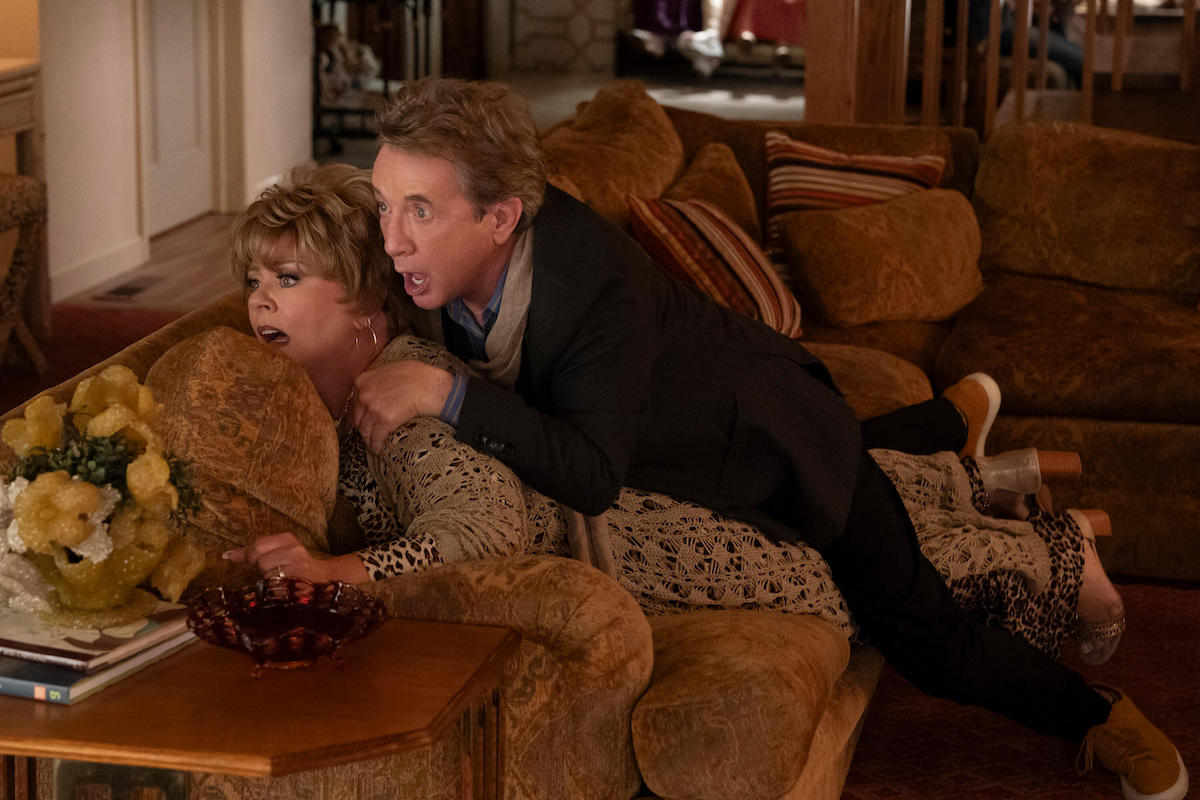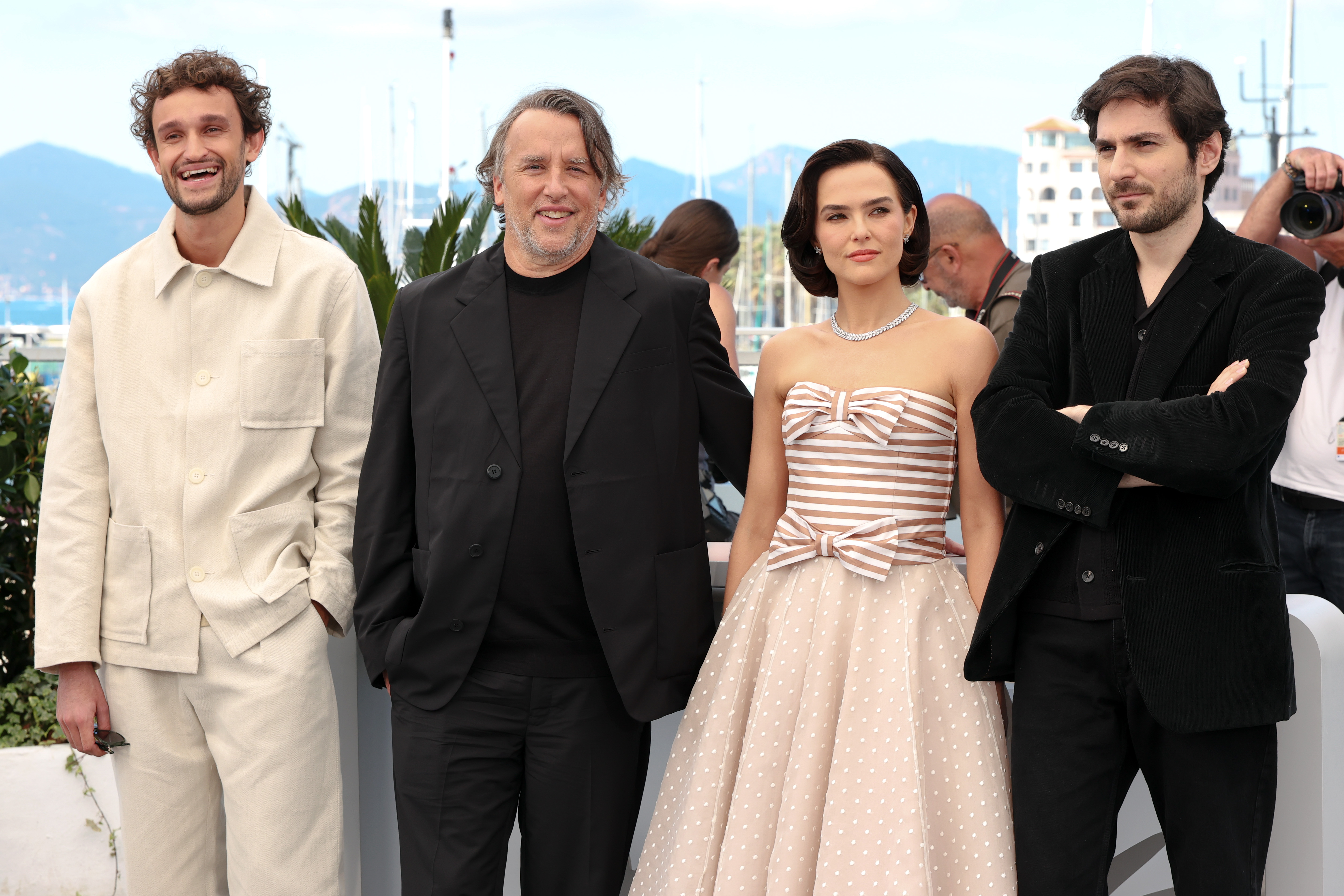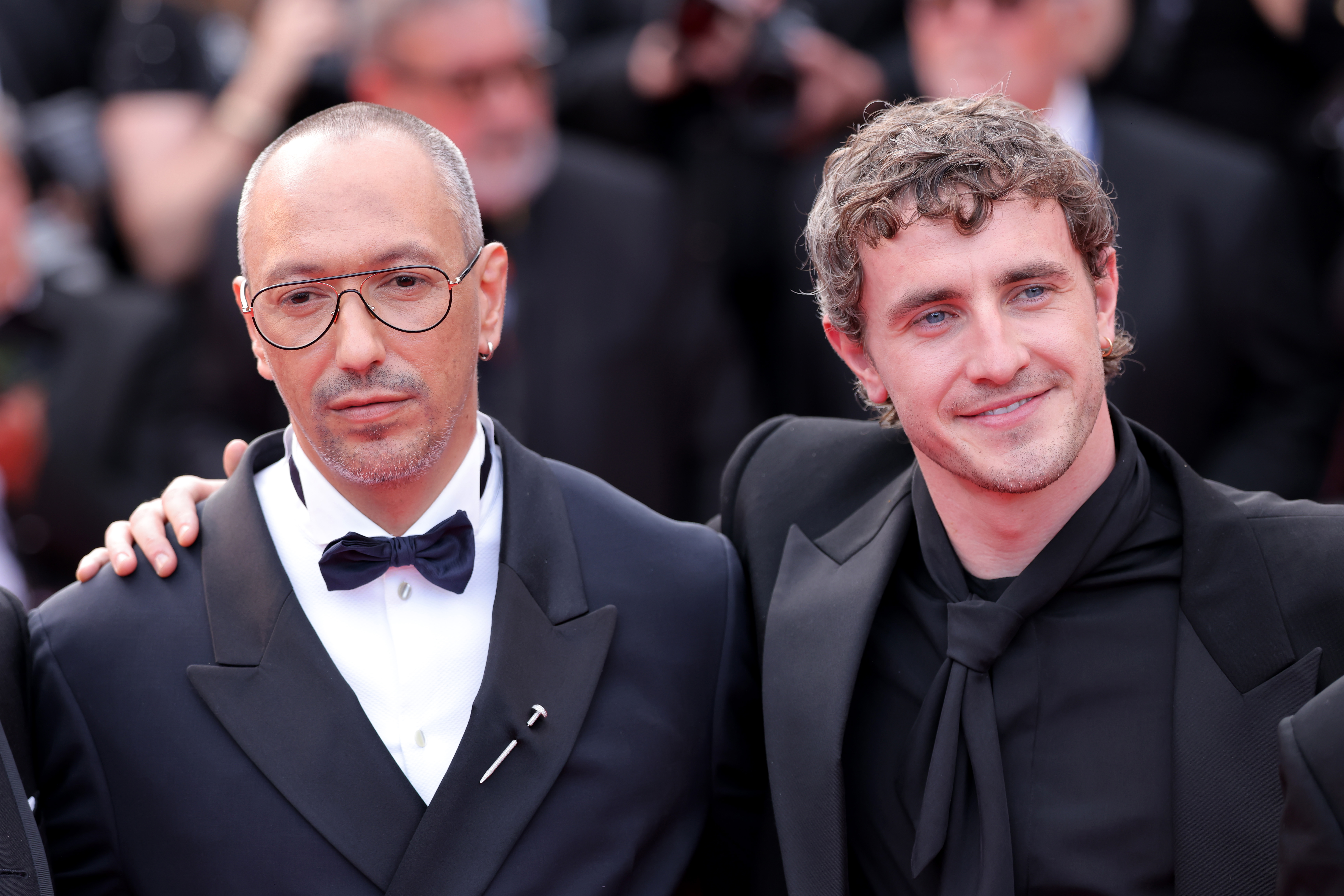
When Martin Short Zoomed in for our interview, he was backstage at the Javits Center in New York City getting ready for Hulu’s Upfront presentation. He volunteered this information willingly, likely to explain the colossal gray curtains hanging all around him, or the director’s chair he was perched in, or the beauty station just over his shoulder.
That should’ve been that, but my Midwestern manners got the best of me, and my first question to the two-time Emmy winner, one-time Tony winner, and all-time comic great became nothing more than polite, near-rhetorical, small talk. “How are you feeling about the Upfronts?,” I said. “Are you excited?”
“Oh, I’m very excited,” Short said. “I’m very excited.”
Reading his statement in print, Short’s answer may seem neutral. But the context implied otherwise. His unflinching smile, flat tone, and pointed repetition of the word “excited” — plus the fact that no one who’s been to the Javits Center before has ever been excited to return — lent his response an inscrutable comic spin. It elevated a bland exchange into a curious one, and within those three little words (once repeated), Short showcased the very gift he was about to discuss: his ability to ground outrageous humor within an unmistakable reality.
“Reality” may seem like the wrong word for a comedian known for roles like Jiminy Glick, Ned Nederlander, and Franck Eggelhoffer — characters so animated they could wear out Bugs Bunny. But Short is consistently able to maximize a part’s comic potential without turning them into an actual cartoon. He can find the honesty in the people he plays, pulling jokes, movements, and line readings from a place that feels true, even if it’s simultaneously absurd.
Maybe Short can explain it better.
“The key to any character is that you have to make it real, even though it now has to be funny because people are funny and characters are funny,” Short said. “But even if you’re playing Franck in ‘Father the Bride,’ you can’t look like you’re trying to be funny, or it won’t be funny.”
At the start of our interview, Short didn’t look like he was trying to be funny. Maybe he wasn’t. But I still laughed. Just as I did later on, when Jiminy’s voice came bursting out of him. Big or small, broad or inscrutable, Short can always make it funny.
Below, the “Only Murders in the Building” star and executive producer breaks down his favorite scene from Season 4 (with Melissa McCarthy), the one time he broke on “Saturday Night Live,” and his next idea for Jiminy Glick.
The following interview has been condensed and edited for clarity and length.
IndieWire: What made you choose this scene as your favorite from “Only Murders in the Building” Season 4?
Martin Short: It’s just because it was with Melissa [McCarthy]. She’s so funny. She’s so lovely. She’s so gifted, and she makes every scene you’re in with her funnier by being 100 percent real. So she created this character that, to me, was indelible to the season.
She plays Charles’ sister, Doreen, which has a very specific role, but she brings so much spontaneity to her.
She’s from the Groundlings, so she’s a brilliant improviser. If you throw a line at her, she throws one back. But what’s amazing about Melissa — and I think is the key to any character work — is that you have to make it real. Even if you’re playing Franck in “Father of the Bride,” you can’t look like you’re trying to be funny, or it won’t be funny. It’s this ability to know how broad you can go while at the same time keeping it real. It’s like a faucet. You turn it up, turn it up, turn it up, and at a certain point you know that you can’t turn it. You’ve gone too big.
When we made “Father of the Bride,” there were so many degrees that Charles Shyer and Nancy Meyers gave me — of little bigger, little bigger, little bigger. We didn’t know what this character was and how big he could go, and they ended up going broad because as long as it felt like a character in life, [it worked.] Working with Melissa, she’s so in the moment and she’s so naturally funny, but she also never loses the character.
When did you first work with her?
That was it.
“Only Murders” was the first time?
I met her briefly once on an airplane.
On an airplane?
Yeah, I went over and said, ‘Hi, how are you?’ — but that was it. So [our first meeting] was just the show, and then I was thrilled when I hosted ‘Jimmy Kimmel’ for a week last spring, and one show was taken over by Jiminy Glick, and she came and flew out from New York just to appear with Jiminy. I was so honored.

Was there a moment when you’re working with her that really impressed you?
Well, I was a massive fan of hers. There’s nothing in the world to me funnier than the outtakes from “This is 40” when she’s in the principal’s office. It’s as funny as anything you could watch. So I’d seen that maybe 14,000 times, but I’ve seen all her movies — “The Heat,” everything she’s done. She was Spicer on “SNL”! And I have many, many friends who have worked with her and adore her, so I wasn’t surprised by her talent. But what made me laugh is something that I would’ve thought on the page was kind of a straight speech and how funny she made it.
Tying together the comedy with reality again.
There are characters in this world that are just hilarious and could be characters in “SNL,” but they’re not. They’re just living a life. Going back to “Father of the Bride,” after we made that movie, I remember going to a wealthy person’s wedding and they had a wedding coordinator there, and he had his initials engraved on his shoes, and I thought, “Oh, we should have done that.”
I love the idea of you, out in the world, collecting those details — the little things that you appreciate about people that you can bring back later on.
We had a neighbor on my street growing up whose voice went very high and very low, all in [the same] sentence. And then 40 years later, I turn it into a character. There are aspects of my cousin Kathy — [saying] “Yep, that’s true, yep.” — and I’m trying to work that into this season of “Only Murders.” I just remember these odd quirks of people that just strike me funny and don’t leave my mind.
Is there anything a co-star can do in a scene that takes you out of it?
I’ve never been someone who breaks often because I’m kind of focused. I remember years ago, as a cast member of “SNL,” I was doing a scene with Billy Crystal. He was going to date my daughter, but I was going to hypnotize him to make sure that he didn’t have lewd intentions. I kept knocking him in the back of his head, and I didn’t realize that I was pushing his wig to the side. It wasn’t until Julia Louis-Dreyfus, playing the daughter, comes downstairs and she just starts laughing. Then I looked, and that made me laugh. But generally I’m too focused.
I mean, there are times where Steve [Martin] will do something [in ‘Only Murders’], but it’s unintentional, and Selena [Gomez] and I will go hysterical. I remember a scene with Molly Shannon in the fourth season when Molly comes in drunk, and in the actual master [shot] you see Selena turning her head away from the camera because she was laughing. They had no other take where she didn’t laugh. So they rationalized, “Well, I guess, Mabel the character would laugh.”
Over the years, you’ve had incredible guest stars on “Only Murders.”
It’s an amazing list.
And a new mystery every season means new cast members every season. Is there anything you do as a series lead and an executive producer to foster a healthy creative environment for newcomers?
My feeling is that you can’t control the outcome of anything, but you can control the experience of doing it. Steve and Selena agree. So I do think the behavior of the leads sets a tone, but most people’s reputations are pretty good. I’ve done this a long time, and I’ve never worked with a monster. It just doesn’t happen. I mean, I have made movies where you kind of go, ‘Oh, this director, I don’t know,’ but I’ll still weasel as many takes [as I can], and I’ll go home and pour a glass of champagne and toast myself saying, “I did everything I could do. He/she are morons and they will destroy [the movie,] I’m sure it’s not going to be any good, but it’s not my fault.”
That’s a very healthy attitude.
It is healthy, but it’s the only attitude you can have.
Well, there are people in the creative community who crave control, and part of that has to stem from so much of the end result being out of their control.
Well, that is true, but you have to accept the truth of it. And the truth of it is you could do the greatest take in your life, and there’s a chance it will never be used. I remember when I made a film with Charles Grodin and I said, “Are you coming to dailies?” And he said, “No, because when it’s not in the movie, I’m just disappointed. So I’m not even going to look at it.”
You just said you can’t control the outcome of anything, but you can control the experience of doing it. How do you marry that with something that is very improvisational, like Jiminy Glick, where you’re playing a character who can be antagonistic toward the guest?
You don’t go after the real issues that you think would upset someone. I’ve never done a roast for that reason. I find them a little too much. They do go after [people’s] sore spots. Jiminy didn’t.
I remember when Jiminy interviewed Alec Baldwin, we did one pass and he was antagonistic. You’re in the moment creating aspects of the character, and I was making it very right-wing to piss Alec off. But then we took a break and they fixed my makeup — that’s usually why we’re breaking anyway, because I’m sweating and then the makeup’s falling off — and Alec said, “Ask me about women.” I said, “OK, good. Alright.” So I said, “So you know different women. What is Hillary Clinton like?” “Well, when she’s banging at your door at three in the morning, I mean…” So he implied that every woman [had sex with him] — Barbara Boxer, he’d had sex with her. And that was all from Alec.
So there’s a collaboration there.
With Glick, the only time I ever just purely improvised with no editing was with Bill Maher last spring. And I thought we were going to have time to edit it. I hadn’t done the character in so long, and I was thinking, “Geez, what if I say something that you just can’t say anymore?” In “Primetime Glick,” I asked Mel Brooks, “What’s your big beef with the Nazis?” — can you say that stuff [now]? I found out when I got there, “No, no, it’s live. What are you talking about? No edit.” I said, “OK, here we go.”
Well, you’ve got to take a little comfort in knowing you’re playing a character. It’s not you, it’s Jiminy.
Oh, no, no, it’s not me. That’s true.
When you brought Jiminy back last year, it felt like people were so happy to see him again — I was so happy to see him again. Do you think the timing, the cultural climate, had anything to do with it? Or were the fans just ready?
I don’t know if I can be objective in answering that truthfully. You know, comedy’s subjective. Some people love Jiminy and some people hate Jiminy. Some people love the Three Stooges and some people hate them. All I know is that the people that would hate Jiminy, I probably would be bored at dinner with them.
But I think it would make sense, I guess, in the world of obsessive P.C. that Jiminy just saying whatever he wants, as outlandish as that can be, [would be cathartic]. You see, Jiminy’s gimmick was that he was the moron. He’s a moron with power. That’s how I always described him.
It’s part of what makes him timeless and part of what makes him so perfect right now.
Well, I think that if I had to do another Jiminy movie, I’d make “Mr. Glick Goes to Washington.” I mean, everyone in that world has an element of absurdity. When you see the news now, you can’t get broader than Marjorie Taylor Greene. You couldn’t create a character broader than that.
“Only Murders in the Building” is available on Hulu. Season 5 is in production.



